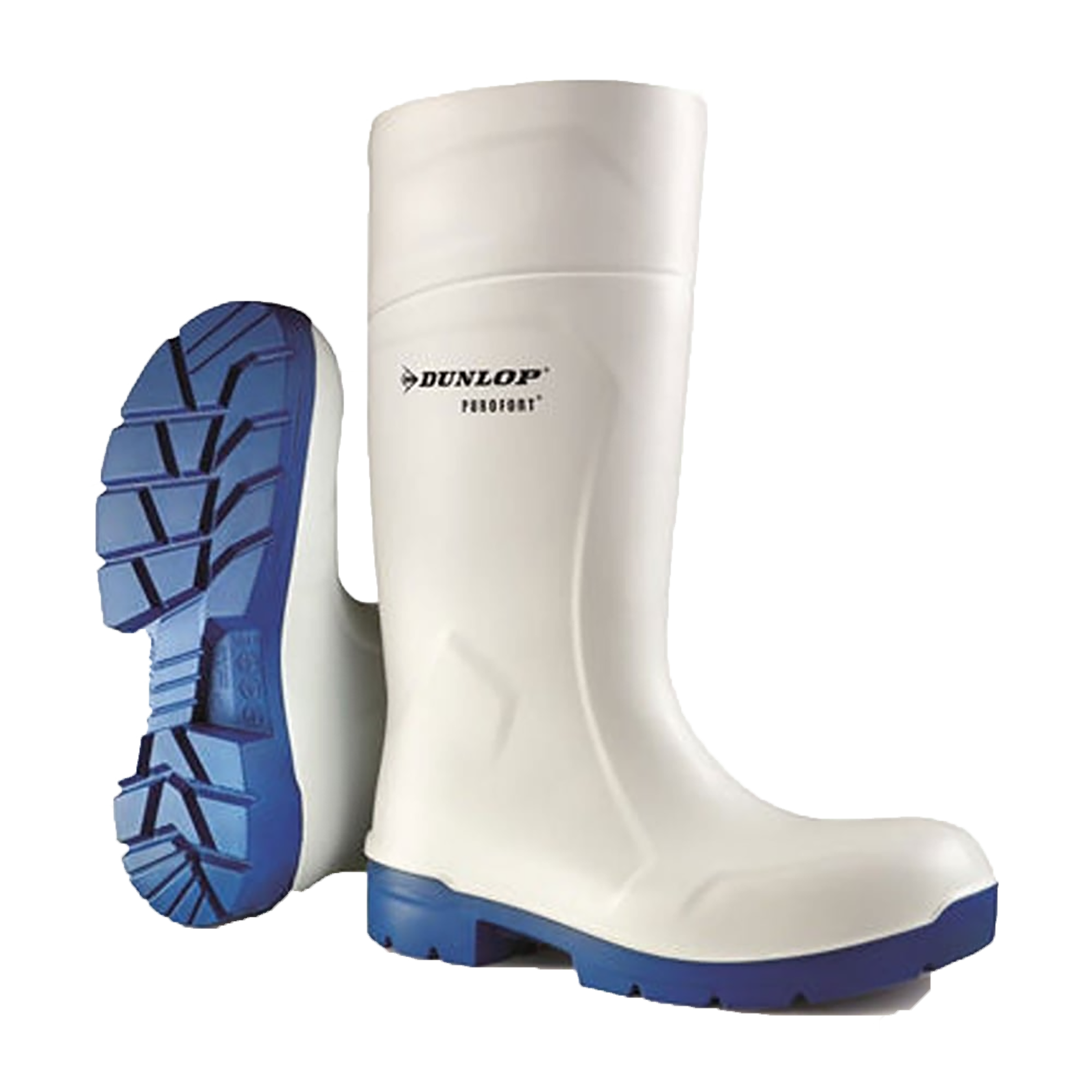
Safety wellies are essential in the food industry for maintaining hygiene, ensuring worker safety, and enhancing overall efficiency. These specialised boots provide protection against various hazards commonly found in food processing environments.
Key Benefits of Safety Wellies
Hygiene and Contamination Control
- Easy to Clean. Safety wellies like Dunlop Purofort are designed to be easily cleaned and sanitised, preventing the buildup of contaminants.
- Seamless Design. Many wellies feature a seamless design that reduces crevices where bacteria can hide, ensuring a higher level of hygiene.
Protection Against Hazards
- Chemical Resistance. Safety wellies are often made from materials that resist chemicals, oils, and fats, protecting workers from harmful substances.
- Slip Resistance. The soles of safety wellies are designed to provide excellent grip on wet and greasy surfaces, reducing the risk of slips and falls.
Durability and Comfort
- Long-Lasting Materials. High-quality materials like polyurethane ensure that safety wellies are durable and can withstand the rigours of the food processing environment.
- Comfortable Fit. Ergonomic designs and cushioned insoles provide comfort for workers who spend long hours on their feet.
Enhancing Food Safety with Wellies
Colour Coding
- Departmental Segregation. Using different coloured wellies for different departments helps prevent cross-contamination and ensures that hygiene standards are maintained.
Regular Maintenance
- Cleaning Protocols. Implementing strict cleaning protocols for wellies ensures that they remain free from contaminants and in good condition.
- Inspection and Replacement. Regularly inspecting wellies for wear and tear and replacing them as needed ensures ongoing protection and safety.
Training and Awareness
- Proper Use. Training staff on the proper use and maintenance of safety wellies ensures that they are used effectively and safely.
- Awareness Programs. Conducting awareness programs about the importance of footwear in food safety helps reinforce best practices among workers.
Why Dunlop Purofort and Bekina Steplite Are Leaders in Abattoirs and Slaughterhouses
Dunlop Purofort Wellies
Material and Construction
- Purofort Technology. Dunlop Purofort wellies are made from a unique material called Purofort, which combines flexibility, durability, and thermal insulation. This material is composed of millions of tiny air pockets, making the boots lightweight and comfortable while providing excellent insulation.
- The molecular structure of Purofort includes hard and soft blocks, which make the boots resistant to cuts and abrasions while maintaining flexibility. This ensures that the boots can withstand the harsh conditions of abattoirs and slaughterhouses.
Safety Features
- Slip Resistance. Purofort wellies have SRC-rated slip-resistant soles, providing excellent grip on wet and greasy surfaces commonly found in meat processing environments. This reduces the risk of slips and falls, enhancing worker safety.
- Chemical Resistance. These boots are resistant to various chemicals, oils, and fats, protecting workers from harmful substances they might encounter.
- Thermal Insulation. Purofort wellies offer superior thermal insulation, keeping feet warm in cold environments, which is crucial for workers in refrigerated areas or cold storage facilities.
Comfort and Ergonomics
- Lightweight Design. Despite their durability, Purofort wellies are 35% lighter than traditional PVC or rubber boots, reducing fatigue during long shifts.
- Ergonomic Fit. The boots are designed to provide a comfortable fit, with features like cushioned insoles and flexible shafts that support natural movement.
Bekina Steplite Wellies
Material and Construction
- NEOTANE Technology. Bekina Steplite wellies are made from NEOTANE, a high-quality polyurethane that is lightweight, flexible, and durable. This material provides excellent resistance to fats, oils, and chemicals, making the boots ideal for use in abattoirs and slaughterhouses.
- NEOTANE is known for its robustness, ensuring that the boots maintain their shape and integrity even under heavy use.
Safety Features
- Slip Resistance. Bekina Steplite wellies feature SRA-approved outsoles that offer exceptional grip on wet and greasy surfaces, minimising the risk of accidents.
- Steel Toe Caps and Midsoles. These boots come with steel toe caps and puncture-resistant midsoles, providing protection against heavy objects and sharp hazards.
- Thermal Insulation. Bekina Steplite wellies are thermally insulating, keeping feet warm in cold environments, which is essential for workers in refrigerated areas.
Comfort and Ergonomics
- Lightweight Design. The lightweight nature of NEOTANE reduces fatigue, making it easier for workers to wear the boots for extended periods.
- Ergonomic Fit. Bekina Steplite wellies are designed with ergonomic footbeds and moisture-wicking properties, ensuring comfort and dryness throughout the workday.
OVERVIEW
Safety wellies, such as Dunlop Purofort and Bekina Steplite, are indispensable in the food industry for ensuring hygiene, protecting workers, and enhancing efficiency.
By choosing high-quality wellies and implementing proper maintenance and training protocols, food processing facilities can maintain high standards of safety and hygiene, ultimately contributing to a safer and more productive work environment.
Importance of Safety Wellies in the Food Industry
Dunlop Purofort and Bekina Steplite wellies stand out in the abattoir and slaughterhouse industry due to their advanced materials, superior safety features, and ergonomic designs. The use of innovative technologies like Purofort and NEOTANE ensures that these boots provide the necessary protection, comfort, and durability required in demanding meat processing environments. By prioritising worker safety and comfort, these wellies help maintain high standards of food safety and efficiency in the UK and beyond.



